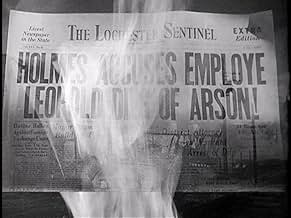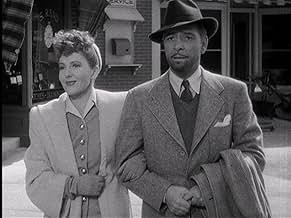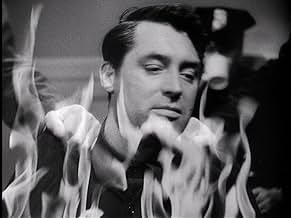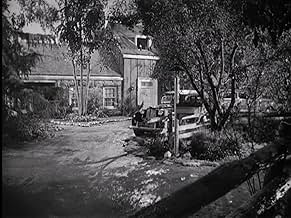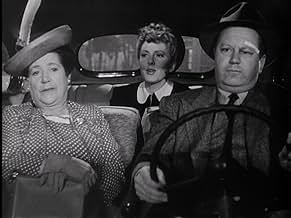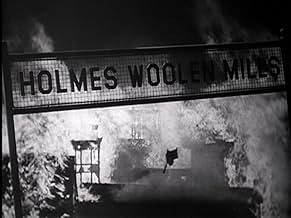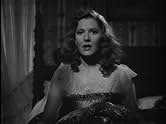Un preso fugado tiene que demostrar su inocencia a un estirado profesor de derecho con la ayuda de una enérgica maestra de escuela.Un preso fugado tiene que demostrar su inocencia a un estirado profesor de derecho con la ayuda de una enérgica maestra de escuela.Un preso fugado tiene que demostrar su inocencia a un estirado profesor de derecho con la ayuda de una enérgica maestra de escuela.
- Dirección
- Guionistas
- Elenco
- Nominado a 7 premios Óscar
- 5 premios ganados y 7 nominaciones en total
- Supreme Court Spectator
- (sin créditos)
- Schoolgirl Noticing Beard
- (sin créditos)
- Townswoman
- (sin créditos)
- Townsman
- (sin créditos)
- Western Union Boy
- (sin créditos)
- Mrs. Pulaski
- (sin créditos)
- Desk Sergeant
- (sin créditos)
Opiniones destacadas
"Town" is a sort of strange hybrid--part screwball comedy, part political activist film. Its screenplay could probably be a little tidier, but I'm not going to complain, because I loved this movie. Cary Grant and Arthur were a terrific match for one another, and Ronald Colman makes a perfect straight man for the both of them. He plays a stuffy professor staying in Arthur's country home while he devotes himself to work. Grant shows up on the lamb for some political activism that got him in trouble, and the movie is devoted to Arthur's and Grant's antics as they first try to hide Grant's identity from Colman and then try to enlist Colman in their populist cause.
This is a great and not especially well known film from the war years. Set aside some time to enjoy it and I'm sure you won't be disappointed.
Grade: A
Grant and Colman are given equal chance to charm us and shine, and they do. Arthur more than keeps up them, delivering her lines so naturally, and she's delightful. The film keeps us guessing as to who she may end up with, as both men are attractive in their own way. I loved seeing a little bit of darkness and danger in Grant here, as well as moments of charm, such as when he widens his eye and assures Arthur that they won't recognize him from the photograph on a Wanted poster, because they hadn't captured his spirit.
The film gets a little heavy-handed in some of its messaging as the film plays out, but I was swayed by just how relevant it is in the times of today's populism. The danger of the mob being manipulated by someone who is corrupt (how can one not think of 'lock her up' while watching that today?), the danger of rushing to judgment instead of listening to the facts and the evidence, and the need to fight for principles were certainly appropriate in 1942, but they're also timeless. Rex Ingram is strong as Colman's servant, including a moment where he gets choked up watching Colman shave off his beard. It seemed a rather odd to me at the time, but since it means Colman is going to fight for justice in this particular case, going against the mob, it may be that Ingram relates this to countless mobs lynching African-Americans, with no one standing up for them.
The film has a few moments where you have to suspend disbelief, but I enjoyed it for its intelligence, and added dimension to what otherwise would have been a standard comedy or romantic comedy. It's a film that will charm you one moment, and make you think the next, and that's not bad.
Here's a quote from Colman's speech to the mob: "This is your law and your finest possession - it makes you free men in a free country. Why have you come here to destroy it? If you know what's good for you, take those weapons home and burn them! And then think... think of this country and of the law that makes it what it is. Think of a world crying for this very law! And maybe you'll understand why you ought to guard it. Why the law has got to be the personal concern of every citizen. To uphold it for your neighbor as well as yourself. Violence against it is one mistake. Another mistake is for any man to look upon the law as just a set of principles. And just so much language printed on fine, heavy paper. Something he recites and then leans back and takes it for granted that justice is automatically being done. Both kinds of men are equally wrong! The law must be engraved in our hearts and practiced every minute to the letter and spirit. It can't even exist unless we're willing to go down into the dust and blood and fight a battle every day of our lives to preserve it. For our neighbor as well as ourself!"
Hallelujah.
Nora and Dilg's attorney Yates (Edgar Buchanan) attempt to drag the brilliant ivory tower attorney into the unfair assumption of guilt of Dilg, but Lightcap refuses. His type of justice, it seems, is all on paper. He doesn't want to get involved with any real people. Leopold, posing as the family gardener, gets into some heated discussions with him, and at Leopold's urging, Nora gives Lightcap special attention. But is any of it enough to make him cave and help Digl?
This is a grand comedy with very serious undertones. Who would ever expect two of the most elegant men in film history, Grant and Colman, to be facing off in a comedy, no less, where one of them is very definitely NOT elegant. Grant is terrific, a truly great actor who rarely let his audience see anything but the famous "Cary Grant" persona. Here, he's a man of the people with a clumsy walk and casual clothes. His pantomime to Nora through his attic window of wanting something to eat is hilarious. The bearded Colman plays the role of a stuffy professor very straight. Lightcap is barely able to stand the chicanery of Nora's household at first, as he has a strict routine. Fast forward and he's flirting and dancing with a smart-mouthed beautician (Glenda Farrell) in order to pump her for information about her boyfriend. His acting, particularly his courtroom speech toward the end of the film, is magnificent. Arthur plays Nora as a dizzy, confused and nervous woman, completely thrown as a landlord, a friend and a woman by the appearance of Leopold and the brilliance of Lightcap, as well as his admiration of her. She's torn between the two of them - and keeps the audience wondering.
Really a must-see for the lesson that true justice must be not read, not preached, but lived and for the wonderful characterizations and direction by Stevens.
¿Sabías que…?
- TriviaLloyd Bridges' tiny role was one of 20 film appearances he made in 1942 alone.
- ErroresFollowing a torrential nighttime rainstorm, the dirt driveway and surrounding earth around the house are perfectly dry early the next morning.
- Citas
Michael Lightcap: This is your law and your finest possession - it makes you free men in a free country. Why have you come here to destroy it? If you know what's good for you, take those weapons home and burn them! And then think... think of this country and of the law that makes it what it is. Think of a world crying for this very law! And maybe you'll understand why you ought to guard it. Why the law has got to be the personal concern of every citizen. To uphold it for your neighbor as well as yourself. Violence against it is one mistake. Another mistake is for any man to look upon the law as just a set of principles. And just so much language printed on fine, heavy paper. Something he recites and then leans back and takes it for granted that justice is automatically being done. Both kinds of men are equally wrong! The law must be engraved in our hearts and practiced every minute to the letter and spirit. It can't even exist unless we're willing to go down into the dust and blood and fight a battle every day of our lives to preserve it. For our neighbor as well as ourself!
- Versiones alternativasThe AMC television showing of this film omits the actual moment, shown in the complete version, in which 'Ronald Colman' is actually informed of his Supreme Court appointment.
- ConexionesFeatured in The Lady with the Torch (1999)
Selecciones populares
- How long is The Talk of the Town?Con tecnología de Alexa
Detalles
Taquilla
- Presupuesto
- USD 1,000,000 (estimado)
- Tiempo de ejecución1 hora 58 minutos
- Color
- Relación de aspecto
- 1.37 : 1
Contribuir a esta página


